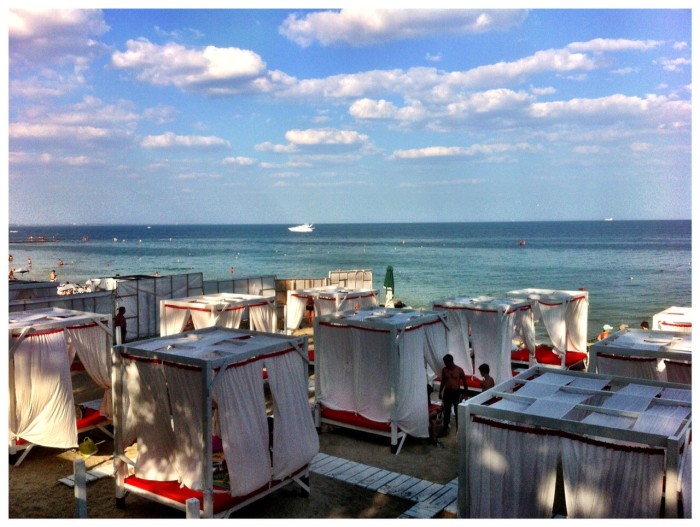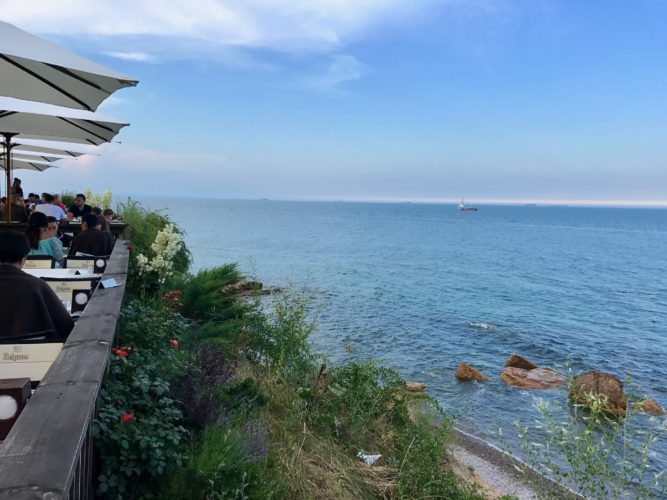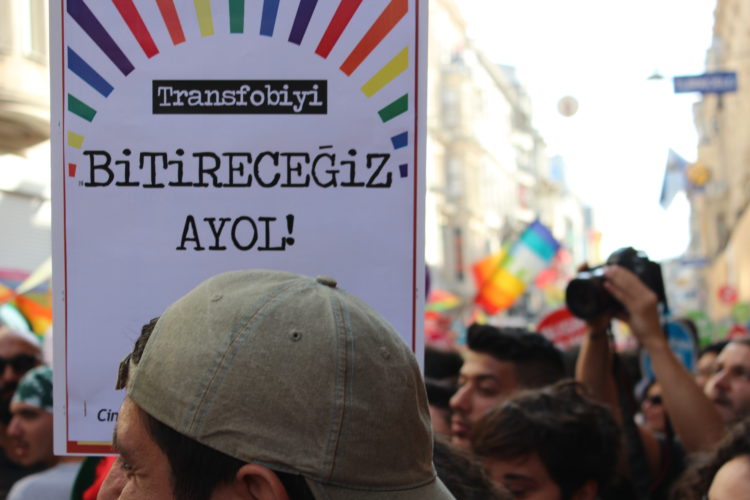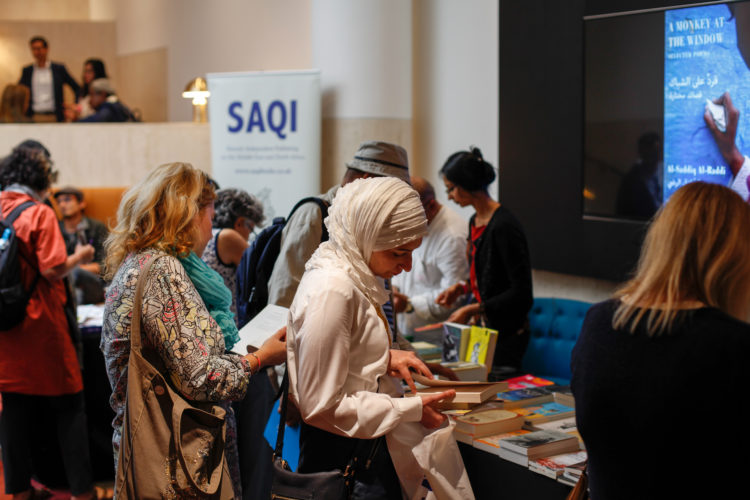ODESSA: UKRAINIAN HEDONISM
and Russia’s failure
By Pierre Scordia
In June 2017, after two years of absence, I return to Odessa, the pearl of the Black Sea. On the plane from Warsaw, a Russian woman sits next to me. She is travelling to Bessarabia to attend the funeral of her grandfather. Since there are no longer flights between Russia and Ukraine, one has to fly through Minsk, Istanbul, Riga or Central Europe. She confesses that she is saddened by the Russian-Ukrainian conflict that has torn her family apart for at least twenty months: "We were no longer talking to each other". She disapproves of Putin's policy in Ukraine but at the same time regrets how the government in Kyiv has decided to cut off all cultural ties with its big neighbour: no flights between the two countries, no more Russian information channels and social networks and even certain serials and books edited in Russia are banned. She fears that Ukraine will eventually impose a visa on Russian citizens at the risk of triggering the expulsion of thousands of Ukrainians residing in the Russian Federation[1].
On arrival at the airport, I noted that the new terminal was finally completed, at least from the outside: it had taken more than five years to build after a long hiatus due to a corruption scandal. To my disappointment, the new terminal is still not operational, but the one dating from Soviet Union days is still functional; inside, the colours of the Ukraine and European Union flags are proudly displayed on screens with a Ukrainian slogan: "Travel without visa, Ukraine gets closer to Europe". This visa waiver is a great victory for President Petro Poroshenko as it has a considerable psychological effect on the Ukrainian population. The sacrifices made during the Maidan revolution have finally paid off. The desire to be part of the Western world remains very strong, especially among the under-40s.
Once downtown, my first impression is that Odessa has regained a certain pre-war joie de vivre, the one of the early 2000s. European, Turkish, Georgian, Israeli and even Belarusian tourists are already present in large numbers even this early in the season. The cafes and restaurants are full and the Ukrainian flag, blue and yellow, floats peacefully everywhere. There are no longer soldiers on the streets, roadblocks or pro-Russian graffiti. The signs of war in the Donbass have completely disappeared. A businessman by the name of Taras tells me that nobody in Odessa wants to recover Donetsk and Lugansk nor pay for the reconstruction of these two lost territories. "However,” he adds, “Ukraine must respond militarily to Russian terrorist aggression in order to obstruct their progress. The port city of Mariupol must be protected at all costs. We do not want this war that is turning back the clock on reforms, which is precisely Vladimir Putin’s intention: to destabilize and demoralize free Ukraine."
"And Crimea?" Silence. It dawns on me that the peninsula’s annexation still hurts and that contrary to Donbass, Ukrainian people have not given up on Crimea. "Crimea is an economic disaster," Taras eventually replied. As long as the Russians occupy it, it will not be able to develop its tourist industry. Rich Russians prefer to go to the French Riviera rather than Crimea; others go to Turkey because it is cheaper. Crimea will become a new Transnistria - Odessites are still suspicious of this secessionist Moldavian republic, frozen in time thanks to Russian money.
In the streets of Odessa, we can see the new police with their Western cars and New York-style uniforms. A middle aged female working for Odessa police told me that corruption fell markedly in 2016, but since the appointment of Serhii Kniaziev, following the government reshuffle, the dodgy practices are back again, especially with the old police guard. As for the city’s management, it is still controlled by the Russophile Gennadiy Trukhanov. Since he owns a company specialising in sidewalk paving, the long promenades along the many beaches of Odessa have been paved; but his ambition does not end there... He would like to widen the great paved avenue of Odessa, the elegant Francuski (French) boulevard and fell its many tall trees, in order to repave it entirely, which has led to strong objection and petitions.
Next I revisited Tararbunary in neighbouring Bessarabia, where I had last been in 2015, and once again met up with the retired man of Bulgarian origin who had wanted me to take his three daughters to the West. His nostalgic melancholy for the Soviet Union and Russian culture remain intact despite the conflict. Thanks to a satellite dish, he continues to listen to the old Soviet songs and watch Russian television. He likes to feed on Russian propaganda, whilst being fully aware of the lies it pours out. Every day now the Russian media speak about the Ukraine they have lost… a lasting peace not yet conceivable.
The retiree reaffirms that he lived better under the old Yanukovych regime. Does he still want me to take his three daughters with me? He does not reply… an eloquent silence! His daughters no longer dream of living in the West. Life is pleasant in Odessa and they all hold positions that give them a good standard of living. On the other hand, they all wish to travel to Western Europe. The visa waiver gives them a sense of freedom even if two of them have already taken Bulgarian citizenship just in case the conflict with Russia degenerates.
But Poland and the Baltic countries are there to ensure that the Russian plans fail and that Ukraine is anchored in the West. The Treaty of Economic Association signed between Kiev and Brussels will finally come into force from 1st September. Polish political, academic and cultural influence is increasingly felt in Odessa. As for the Turks, their economic presence is considerable. The city of Istanbul is paying for the construction of beautiful gardens in the centre of Odessa. Turkish tourists increasingly cross the pond (the Black Sea) to enjoy the hedonistic atmosphere of Odessa. Ukraine does not require a visa for Turkish nationals who can indulge in the sweet "vices" of Western civilization that President Erdogan would like to extirpate from his Republic; his countrymen do not remain insensitive to Ukrainian beauties and the indulgence of a warm night.
Vladimir Putin's policy has proved fruitful in the short term because it undermined the morale of the Ukrainian people yet it remains disastrous in the long run for relations between the two countries not least because his aggression has triggered anti-Russian sentiment among Russian-speaking Ukrainians. The Russian military onslaught has led not only to the end of cultural and tourist exchanges between Russia and Odessa but also to the decline of Russian economic investment. This vacuum has been rapidly filled by the European Union and Turkey. You see it immediately when you enter a supermarket, with Latin alphabet product labels increasingly visible on the shelves.
A cultural revolution is taking place in this south-western part of Ukraine. Youngsters are starting to learn English and are no longer afraid to smile at foreigners. The irreversible economic and political links with the European Union will eventually put an end to excessive corruption here and moreover if Russian aggression continues, it is possible that one day Ukraine will eventually Latinize its alphabet and become yet more anchored in the West.
Back on the flight bound to Warsaw, it seemed to me that the psychological impact of the Revolution of Dignity in addition to an association with the European Union (the British should think twice before leaving this guardian of economic prosperity and democratic values) are slowly but surely changing the mindset of the Ukrainian people. I feel confident that, even with corruption and political setbacks, Ukraine is on the right path to become a modern and vibrant European democracy.
FΩRMIdea London, 7th August 2017.
[1] Two weeks later, Kiev indeed announced the obligation for all Russian nationals to obtain authorisation before entering Ukraine.
Version française : Huffington Post



